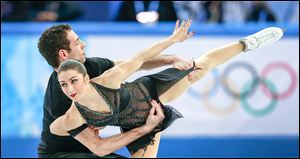
COMPETITION GETS UNDER WAY
Russia basks in glory as host of Winter Games
Brushing off critics, officials hail triumph of the Olympic spirit
2/7/2014
U.S. figure skaters Simon Shnapir and Marissa Castelli perform at the Iceberg Skating Palace in Sochi, Russia. Meanwhile, Russian President Vladimir Putin seems unruffled by a storm of major and minor criticism.
MOSCOW — When Russian President Vladimir Putin delivered his successful pitch to host the Winter Olympic Games in Sochi, he declared it an international validation of the Russia that emerged from the ruins of the Soviet Union.
“It is, beyond any doubt, a judgment on our country,” he said nearly seven years ago.
Now, as the first events begin, the Games have become a self-evident triumph of Russia’s will for Mr. Putin and his allies.
The avalanche of criticism that has fallen, from minor complaints about ill-prepared hotels and stray dogs to serious concerns about the costs, security, and human rights, is brushed away like snowflakes from a winter coat.
“Its realization is already a huge win for our country,” Dmitry Kozak, a deputy prime minister and one of Mr. Putin’s longest-standing aides, said Thursday in Sochi.
He used a phrase attributed to Catherine the Great when she intervened to halt the court-martial of a general who had stormed an Ottoman fortress without orders in the 18th century: “Victors are not judged.”
For Putin critics, a reckoning looms nonetheless.
What was once supposed to be a crowning moment for Russia and Mr. Putin, they say, is now awkwardly coinciding with a significant slowdown in Russia’s economy, raising questions about whether the $50 billion or so spent on Sochi might better have been invested elsewhere.
Lilia Shevtsova, an analyst at the Carnegie Moscow Center, argued that the International Olympic Committee had awarded the Games to Sochi — over Salzburg, Austria, and Pyeongchang, South Korea — at a time when Mr. Putin was at the zenith of his powers in his second term but when the verdict on his legacy remained an open one.
Many had been critical of his authoritarian instincts after he rose to power — including the tightening of media and political freedoms and the brutal war in Chechnya — but Russia had recovered from the chaos of the 1990s.
“At that time, Russia was ‘rising from its knees,’” Ms. Shevtsova wrote, “whereas now — in 2014 — Russia has started its downward slide.”
The sheer cost of the Olympic Games has become a liability even in a political system that allows little room for public debate about government spending.
“It is about a lost chance,” said Alexei Navalny, whose Foundation for the Fight Against Corruption recently published a Web site charting what critics have called excessive waste and corruption in the construction of the Olympic facilities.
“It is about what Russia could have done with this money. We could have had a new industrialization along the same lines as the industrialization under Stalin.”
Russia is not about to collapse, and Mr. Putin’s approval rating, bolstered by positive coverage on state television, remains as high as when he first came to office.
Hosting the Olympics, however, seems to have lost some of the luster that officials expected for Russia’s prestige at home and abroad.
The Olympics have refocused international attention on the hard-line policies that Mr. Putin’s government has pursued since he returned to the presidency in 2012 and prompted calls for protests and even boycotts.
The list is long: Russia’s support for Syrian President Bashar Assad; its efforts to keep Ukraine out of the orbit of the European Union; its prosecution of political opponents, real and perceived; its restrictions on foreign adoptions, and the passage of a law last year prohibiting “homosexual propaganda” aimed at children.
“The Games are supposed to be outside of politics,” said Alexander Zhukov, the deputy speaker of the lower house of parliament and the chairman of the Russian Olympic Committee. “Those who try to pin some political tails on them are just being undignified.”
To many Russian officials, the criticism has an undertow of Western hostility toward Russia, meant to deny the country its rightful place in the world order.
It is a sentiment that shapes Russia’s foreign policy, especially toward the United States.
Mr. Putin, for his part, has been seemingly impervious to the flurry of rebukes.
“We have strong memories of the emotional, uplifting enthusiasm we felt during the 1980 Moscow Olympics,” Mr. Putin said, in English, when he opened the 126th session of the International Olympic Committee on Tuesday, omitting any reference to the United States-led boycott that marred those Games.
“And we feel truly joyful and positive because the mighty, inspiring spirit of the Olympic Games is once against returning to our nation.”